HLSC111: Assessment 2 Essay - Supporting Harry's Dietary Change
VerifiedAdded on 2022/11/01
|10
|2482
|383
Essay
AI Summary
This essay explores the application of the Transtheoretical Model (TTM) and motivational interviewing techniques to support a patient, Harry, in making dietary changes to reduce obesity and improve his health. The essay begins by introducing the TTM and its stages of change (precontemplation, contemplation, preparation, action, maintenance, and termination), explaining how healthcare professionals can support Harry through each stage. It then delves into the use of motivational interviewing techniques, such as open-ended questions, change talk, exploring the importance of change, making affirmations, using reflections, and summarization, to help Harry understand the need for change and build his motivation. The essay emphasizes the importance of healthcare professionals in guiding and encouraging patients to adopt healthier behaviors for long-term well-being. The conclusion reiterates the effectiveness of these tools in supporting Harry's journey towards a healthier lifestyle, highlighting the crucial role of healthcare providers in this process.
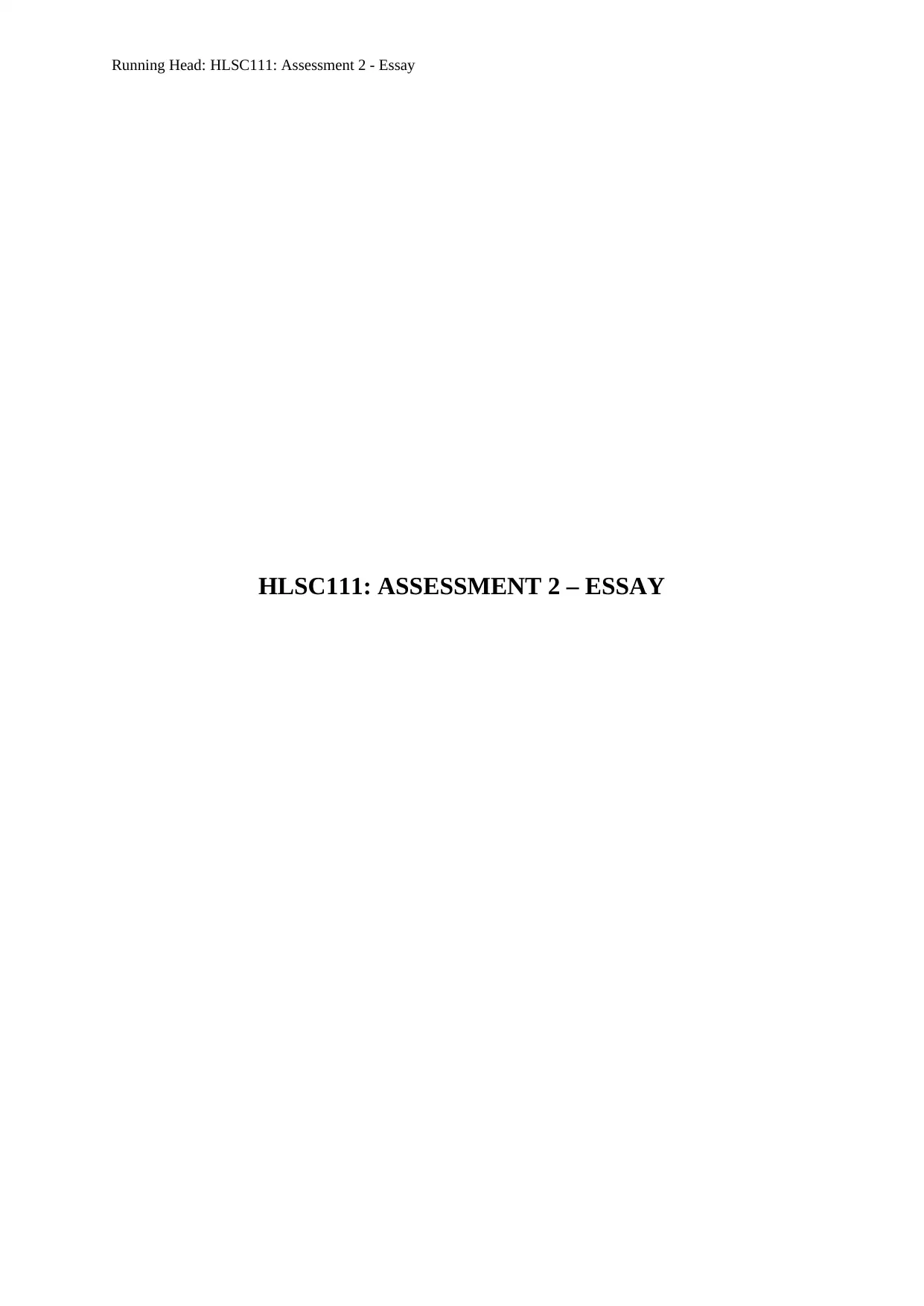
Running Head: HLSC111: Assessment 2 - Essay
HLSC111: ASSESSMENT 2 – ESSAY
HLSC111: ASSESSMENT 2 – ESSAY
Paraphrase This Document
Need a fresh take? Get an instant paraphrase of this document with our AI Paraphraser
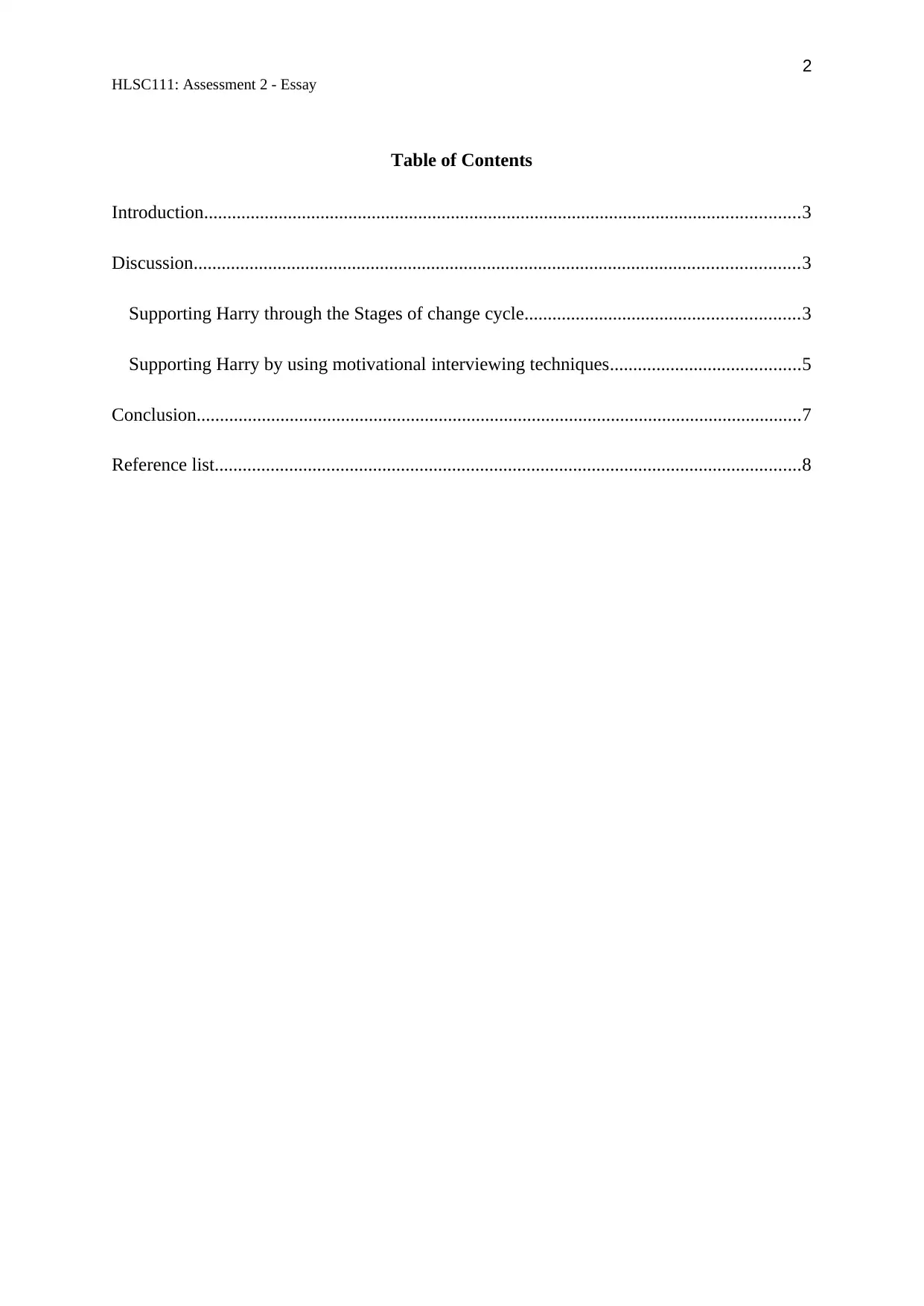
2
HLSC111: Assessment 2 - Essay
Table of Contents
Introduction................................................................................................................................3
Discussion..................................................................................................................................3
Supporting Harry through the Stages of change cycle...........................................................3
Supporting Harry by using motivational interviewing techniques.........................................5
Conclusion..................................................................................................................................7
Reference list..............................................................................................................................8
HLSC111: Assessment 2 - Essay
Table of Contents
Introduction................................................................................................................................3
Discussion..................................................................................................................................3
Supporting Harry through the Stages of change cycle...........................................................3
Supporting Harry by using motivational interviewing techniques.........................................5
Conclusion..................................................................................................................................7
Reference list..............................................................................................................................8
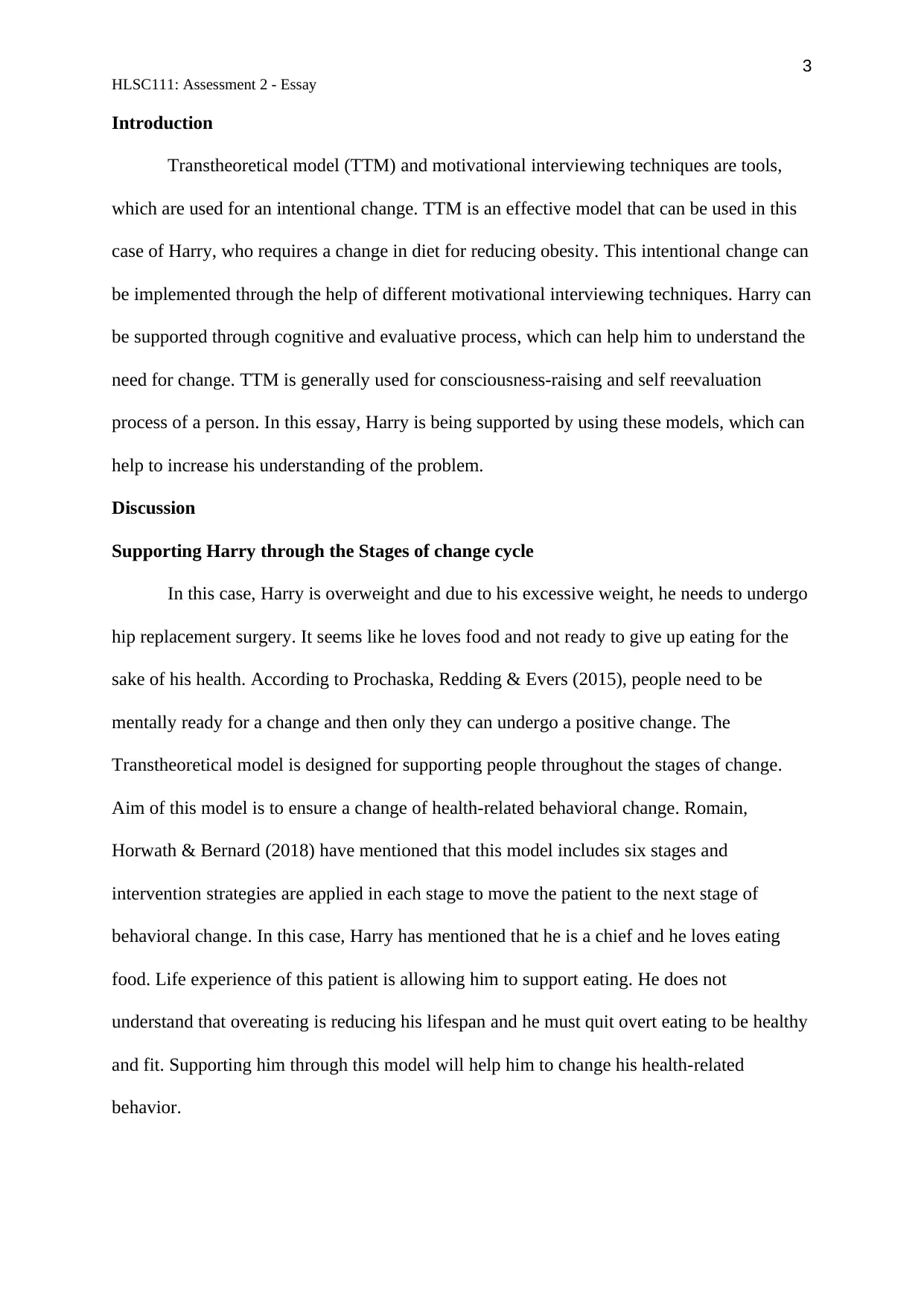
3
HLSC111: Assessment 2 - Essay
Introduction
Transtheoretical model (TTM) and motivational interviewing techniques are tools,
which are used for an intentional change. TTM is an effective model that can be used in this
case of Harry, who requires a change in diet for reducing obesity. This intentional change can
be implemented through the help of different motivational interviewing techniques. Harry can
be supported through cognitive and evaluative process, which can help him to understand the
need for change. TTM is generally used for consciousness-raising and self reevaluation
process of a person. In this essay, Harry is being supported by using these models, which can
help to increase his understanding of the problem.
Discussion
Supporting Harry through the Stages of change cycle
In this case, Harry is overweight and due to his excessive weight, he needs to undergo
hip replacement surgery. It seems like he loves food and not ready to give up eating for the
sake of his health. According to Prochaska, Redding & Evers (2015), people need to be
mentally ready for a change and then only they can undergo a positive change. The
Transtheoretical model is designed for supporting people throughout the stages of change.
Aim of this model is to ensure a change of health-related behavioral change. Romain,
Horwath & Bernard (2018) have mentioned that this model includes six stages and
intervention strategies are applied in each stage to move the patient to the next stage of
behavioral change. In this case, Harry has mentioned that he is a chief and he loves eating
food. Life experience of this patient is allowing him to support eating. He does not
understand that overeating is reducing his lifespan and he must quit overt eating to be healthy
and fit. Supporting him through this model will help him to change his health-related
behavior.
HLSC111: Assessment 2 - Essay
Introduction
Transtheoretical model (TTM) and motivational interviewing techniques are tools,
which are used for an intentional change. TTM is an effective model that can be used in this
case of Harry, who requires a change in diet for reducing obesity. This intentional change can
be implemented through the help of different motivational interviewing techniques. Harry can
be supported through cognitive and evaluative process, which can help him to understand the
need for change. TTM is generally used for consciousness-raising and self reevaluation
process of a person. In this essay, Harry is being supported by using these models, which can
help to increase his understanding of the problem.
Discussion
Supporting Harry through the Stages of change cycle
In this case, Harry is overweight and due to his excessive weight, he needs to undergo
hip replacement surgery. It seems like he loves food and not ready to give up eating for the
sake of his health. According to Prochaska, Redding & Evers (2015), people need to be
mentally ready for a change and then only they can undergo a positive change. The
Transtheoretical model is designed for supporting people throughout the stages of change.
Aim of this model is to ensure a change of health-related behavioral change. Romain,
Horwath & Bernard (2018) have mentioned that this model includes six stages and
intervention strategies are applied in each stage to move the patient to the next stage of
behavioral change. In this case, Harry has mentioned that he is a chief and he loves eating
food. Life experience of this patient is allowing him to support eating. He does not
understand that overeating is reducing his lifespan and he must quit overt eating to be healthy
and fit. Supporting him through this model will help him to change his health-related
behavior.
⊘ This is a preview!⊘
Do you want full access?
Subscribe today to unlock all pages.

Trusted by 1+ million students worldwide
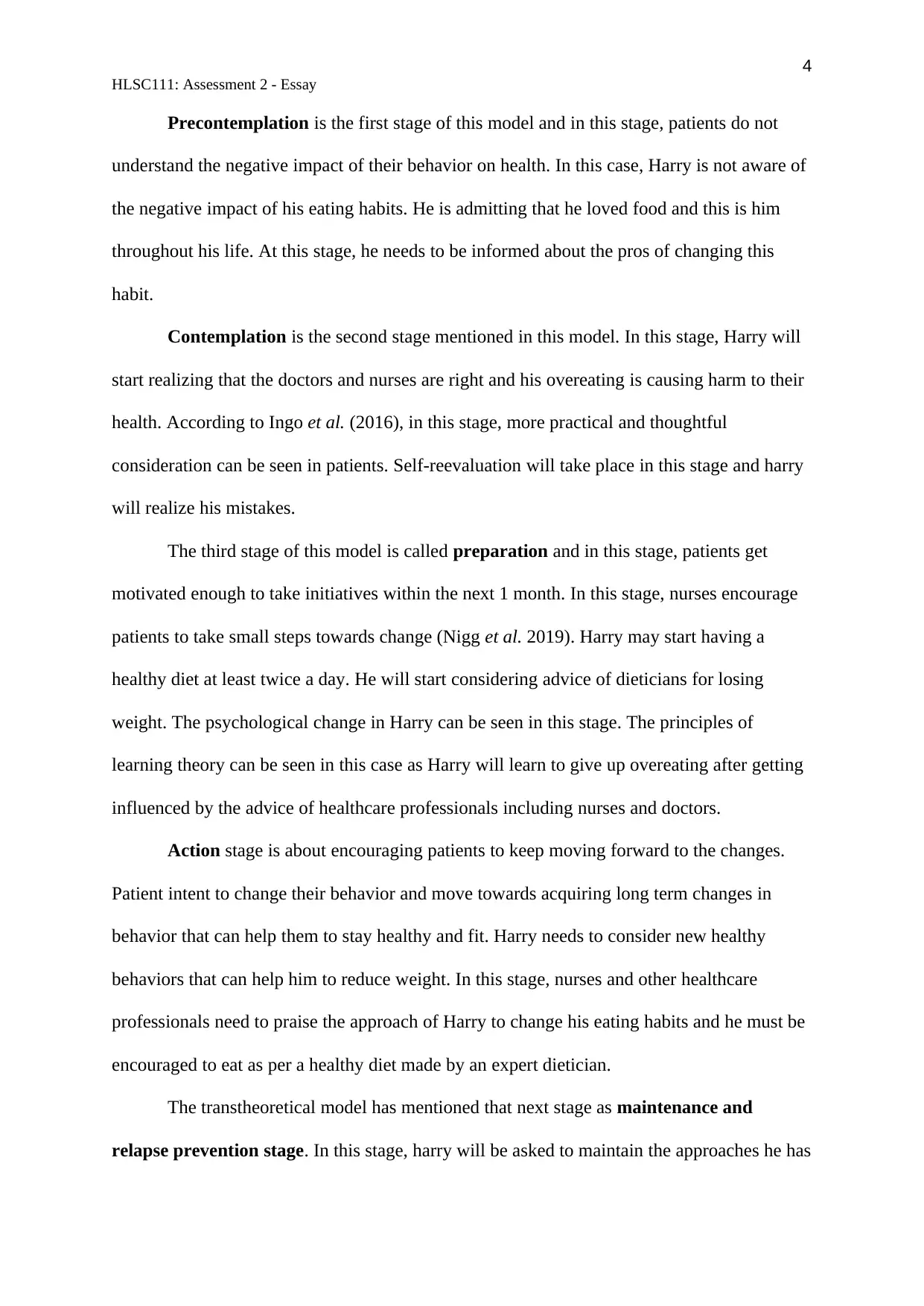
4
HLSC111: Assessment 2 - Essay
Precontemplation is the first stage of this model and in this stage, patients do not
understand the negative impact of their behavior on health. In this case, Harry is not aware of
the negative impact of his eating habits. He is admitting that he loved food and this is him
throughout his life. At this stage, he needs to be informed about the pros of changing this
habit.
Contemplation is the second stage mentioned in this model. In this stage, Harry will
start realizing that the doctors and nurses are right and his overeating is causing harm to their
health. According to Ingo et al. (2016), in this stage, more practical and thoughtful
consideration can be seen in patients. Self-reevaluation will take place in this stage and harry
will realize his mistakes.
The third stage of this model is called preparation and in this stage, patients get
motivated enough to take initiatives within the next 1 month. In this stage, nurses encourage
patients to take small steps towards change (Nigg et al. 2019). Harry may start having a
healthy diet at least twice a day. He will start considering advice of dieticians for losing
weight. The psychological change in Harry can be seen in this stage. The principles of
learning theory can be seen in this case as Harry will learn to give up overeating after getting
influenced by the advice of healthcare professionals including nurses and doctors.
Action stage is about encouraging patients to keep moving forward to the changes.
Patient intent to change their behavior and move towards acquiring long term changes in
behavior that can help them to stay healthy and fit. Harry needs to consider new healthy
behaviors that can help him to reduce weight. In this stage, nurses and other healthcare
professionals need to praise the approach of Harry to change his eating habits and he must be
encouraged to eat as per a healthy diet made by an expert dietician.
The transtheoretical model has mentioned that next stage as maintenance and
relapse prevention stage. In this stage, harry will be asked to maintain the approaches he has
HLSC111: Assessment 2 - Essay
Precontemplation is the first stage of this model and in this stage, patients do not
understand the negative impact of their behavior on health. In this case, Harry is not aware of
the negative impact of his eating habits. He is admitting that he loved food and this is him
throughout his life. At this stage, he needs to be informed about the pros of changing this
habit.
Contemplation is the second stage mentioned in this model. In this stage, Harry will
start realizing that the doctors and nurses are right and his overeating is causing harm to their
health. According to Ingo et al. (2016), in this stage, more practical and thoughtful
consideration can be seen in patients. Self-reevaluation will take place in this stage and harry
will realize his mistakes.
The third stage of this model is called preparation and in this stage, patients get
motivated enough to take initiatives within the next 1 month. In this stage, nurses encourage
patients to take small steps towards change (Nigg et al. 2019). Harry may start having a
healthy diet at least twice a day. He will start considering advice of dieticians for losing
weight. The psychological change in Harry can be seen in this stage. The principles of
learning theory can be seen in this case as Harry will learn to give up overeating after getting
influenced by the advice of healthcare professionals including nurses and doctors.
Action stage is about encouraging patients to keep moving forward to the changes.
Patient intent to change their behavior and move towards acquiring long term changes in
behavior that can help them to stay healthy and fit. Harry needs to consider new healthy
behaviors that can help him to reduce weight. In this stage, nurses and other healthcare
professionals need to praise the approach of Harry to change his eating habits and he must be
encouraged to eat as per a healthy diet made by an expert dietician.
The transtheoretical model has mentioned that next stage as maintenance and
relapse prevention stage. In this stage, harry will be asked to maintain the approaches he has
Paraphrase This Document
Need a fresh take? Get an instant paraphrase of this document with our AI Paraphraser
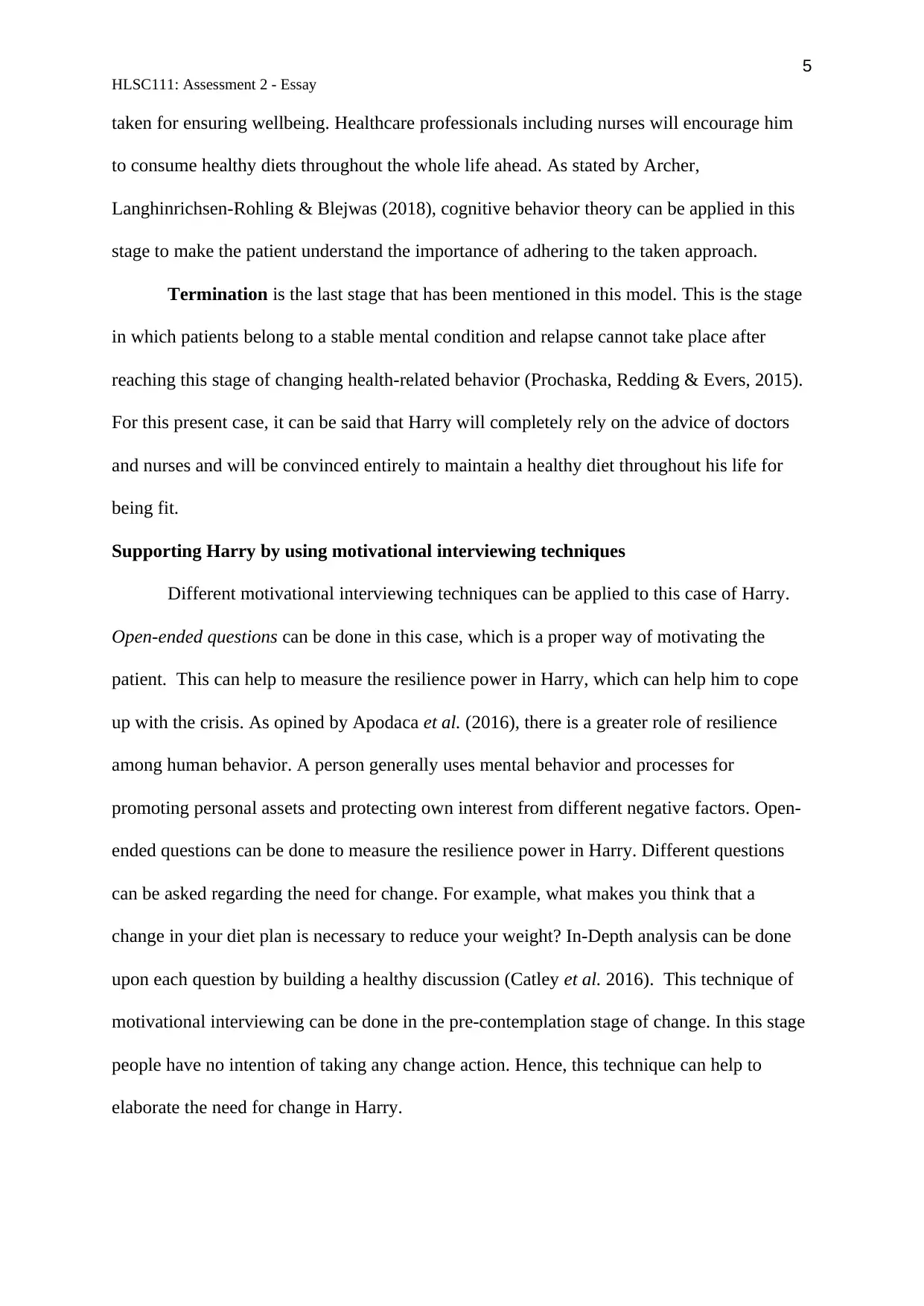
5
HLSC111: Assessment 2 - Essay
taken for ensuring wellbeing. Healthcare professionals including nurses will encourage him
to consume healthy diets throughout the whole life ahead. As stated by Archer,
Langhinrichsen-Rohling & Blejwas (2018), cognitive behavior theory can be applied in this
stage to make the patient understand the importance of adhering to the taken approach.
Termination is the last stage that has been mentioned in this model. This is the stage
in which patients belong to a stable mental condition and relapse cannot take place after
reaching this stage of changing health-related behavior (Prochaska, Redding & Evers, 2015).
For this present case, it can be said that Harry will completely rely on the advice of doctors
and nurses and will be convinced entirely to maintain a healthy diet throughout his life for
being fit.
Supporting Harry by using motivational interviewing techniques
Different motivational interviewing techniques can be applied to this case of Harry.
Open-ended questions can be done in this case, which is a proper way of motivating the
patient. This can help to measure the resilience power in Harry, which can help him to cope
up with the crisis. As opined by Apodaca et al. (2016), there is a greater role of resilience
among human behavior. A person generally uses mental behavior and processes for
promoting personal assets and protecting own interest from different negative factors. Open-
ended questions can be done to measure the resilience power in Harry. Different questions
can be asked regarding the need for change. For example, what makes you think that a
change in your diet plan is necessary to reduce your weight? In-Depth analysis can be done
upon each question by building a healthy discussion (Catley et al. 2016). This technique of
motivational interviewing can be done in the pre-contemplation stage of change. In this stage
people have no intention of taking any change action. Hence, this technique can help to
elaborate the need for change in Harry.
HLSC111: Assessment 2 - Essay
taken for ensuring wellbeing. Healthcare professionals including nurses will encourage him
to consume healthy diets throughout the whole life ahead. As stated by Archer,
Langhinrichsen-Rohling & Blejwas (2018), cognitive behavior theory can be applied in this
stage to make the patient understand the importance of adhering to the taken approach.
Termination is the last stage that has been mentioned in this model. This is the stage
in which patients belong to a stable mental condition and relapse cannot take place after
reaching this stage of changing health-related behavior (Prochaska, Redding & Evers, 2015).
For this present case, it can be said that Harry will completely rely on the advice of doctors
and nurses and will be convinced entirely to maintain a healthy diet throughout his life for
being fit.
Supporting Harry by using motivational interviewing techniques
Different motivational interviewing techniques can be applied to this case of Harry.
Open-ended questions can be done in this case, which is a proper way of motivating the
patient. This can help to measure the resilience power in Harry, which can help him to cope
up with the crisis. As opined by Apodaca et al. (2016), there is a greater role of resilience
among human behavior. A person generally uses mental behavior and processes for
promoting personal assets and protecting own interest from different negative factors. Open-
ended questions can be done to measure the resilience power in Harry. Different questions
can be asked regarding the need for change. For example, what makes you think that a
change in your diet plan is necessary to reduce your weight? In-Depth analysis can be done
upon each question by building a healthy discussion (Catley et al. 2016). This technique of
motivational interviewing can be done in the pre-contemplation stage of change. In this stage
people have no intention of taking any change action. Hence, this technique can help to
elaborate the need for change in Harry.
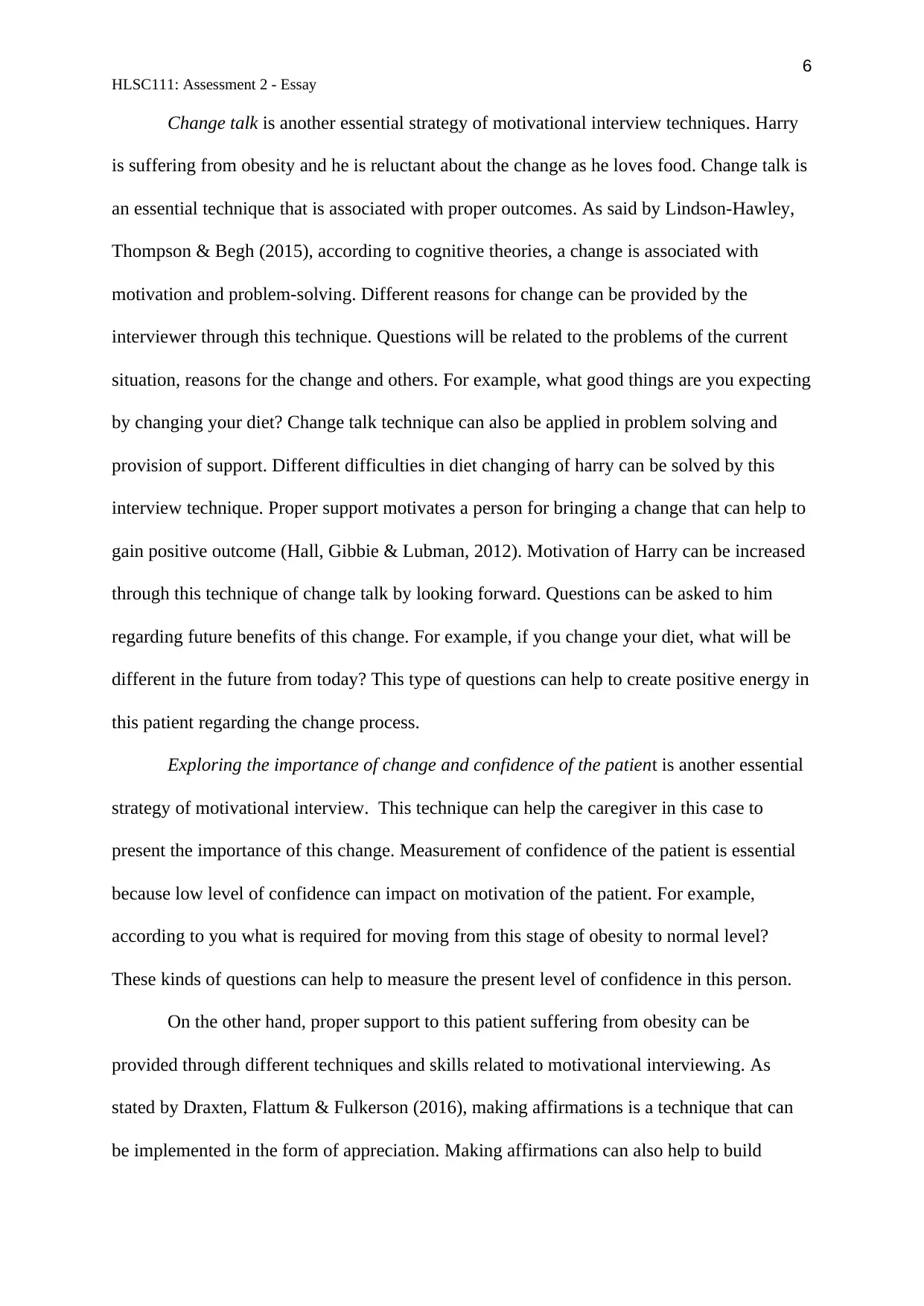
6
HLSC111: Assessment 2 - Essay
Change talk is another essential strategy of motivational interview techniques. Harry
is suffering from obesity and he is reluctant about the change as he loves food. Change talk is
an essential technique that is associated with proper outcomes. As said by Lindson‐Hawley,
Thompson & Begh (2015), according to cognitive theories, a change is associated with
motivation and problem-solving. Different reasons for change can be provided by the
interviewer through this technique. Questions will be related to the problems of the current
situation, reasons for the change and others. For example, what good things are you expecting
by changing your diet? Change talk technique can also be applied in problem solving and
provision of support. Different difficulties in diet changing of harry can be solved by this
interview technique. Proper support motivates a person for bringing a change that can help to
gain positive outcome (Hall, Gibbie & Lubman, 2012). Motivation of Harry can be increased
through this technique of change talk by looking forward. Questions can be asked to him
regarding future benefits of this change. For example, if you change your diet, what will be
different in the future from today? This type of questions can help to create positive energy in
this patient regarding the change process.
Exploring the importance of change and confidence of the patient is another essential
strategy of motivational interview. This technique can help the caregiver in this case to
present the importance of this change. Measurement of confidence of the patient is essential
because low level of confidence can impact on motivation of the patient. For example,
according to you what is required for moving from this stage of obesity to normal level?
These kinds of questions can help to measure the present level of confidence in this person.
On the other hand, proper support to this patient suffering from obesity can be
provided through different techniques and skills related to motivational interviewing. As
stated by Draxten, Flattum & Fulkerson (2016), making affirmations is a technique that can
be implemented in the form of appreciation. Making affirmations can also help to build
HLSC111: Assessment 2 - Essay
Change talk is another essential strategy of motivational interview techniques. Harry
is suffering from obesity and he is reluctant about the change as he loves food. Change talk is
an essential technique that is associated with proper outcomes. As said by Lindson‐Hawley,
Thompson & Begh (2015), according to cognitive theories, a change is associated with
motivation and problem-solving. Different reasons for change can be provided by the
interviewer through this technique. Questions will be related to the problems of the current
situation, reasons for the change and others. For example, what good things are you expecting
by changing your diet? Change talk technique can also be applied in problem solving and
provision of support. Different difficulties in diet changing of harry can be solved by this
interview technique. Proper support motivates a person for bringing a change that can help to
gain positive outcome (Hall, Gibbie & Lubman, 2012). Motivation of Harry can be increased
through this technique of change talk by looking forward. Questions can be asked to him
regarding future benefits of this change. For example, if you change your diet, what will be
different in the future from today? This type of questions can help to create positive energy in
this patient regarding the change process.
Exploring the importance of change and confidence of the patient is another essential
strategy of motivational interview. This technique can help the caregiver in this case to
present the importance of this change. Measurement of confidence of the patient is essential
because low level of confidence can impact on motivation of the patient. For example,
according to you what is required for moving from this stage of obesity to normal level?
These kinds of questions can help to measure the present level of confidence in this person.
On the other hand, proper support to this patient suffering from obesity can be
provided through different techniques and skills related to motivational interviewing. As
stated by Draxten, Flattum & Fulkerson (2016), making affirmations is a technique that can
be implemented in the form of appreciation. Making affirmations can also help to build
⊘ This is a preview!⊘
Do you want full access?
Subscribe today to unlock all pages.

Trusted by 1+ million students worldwide
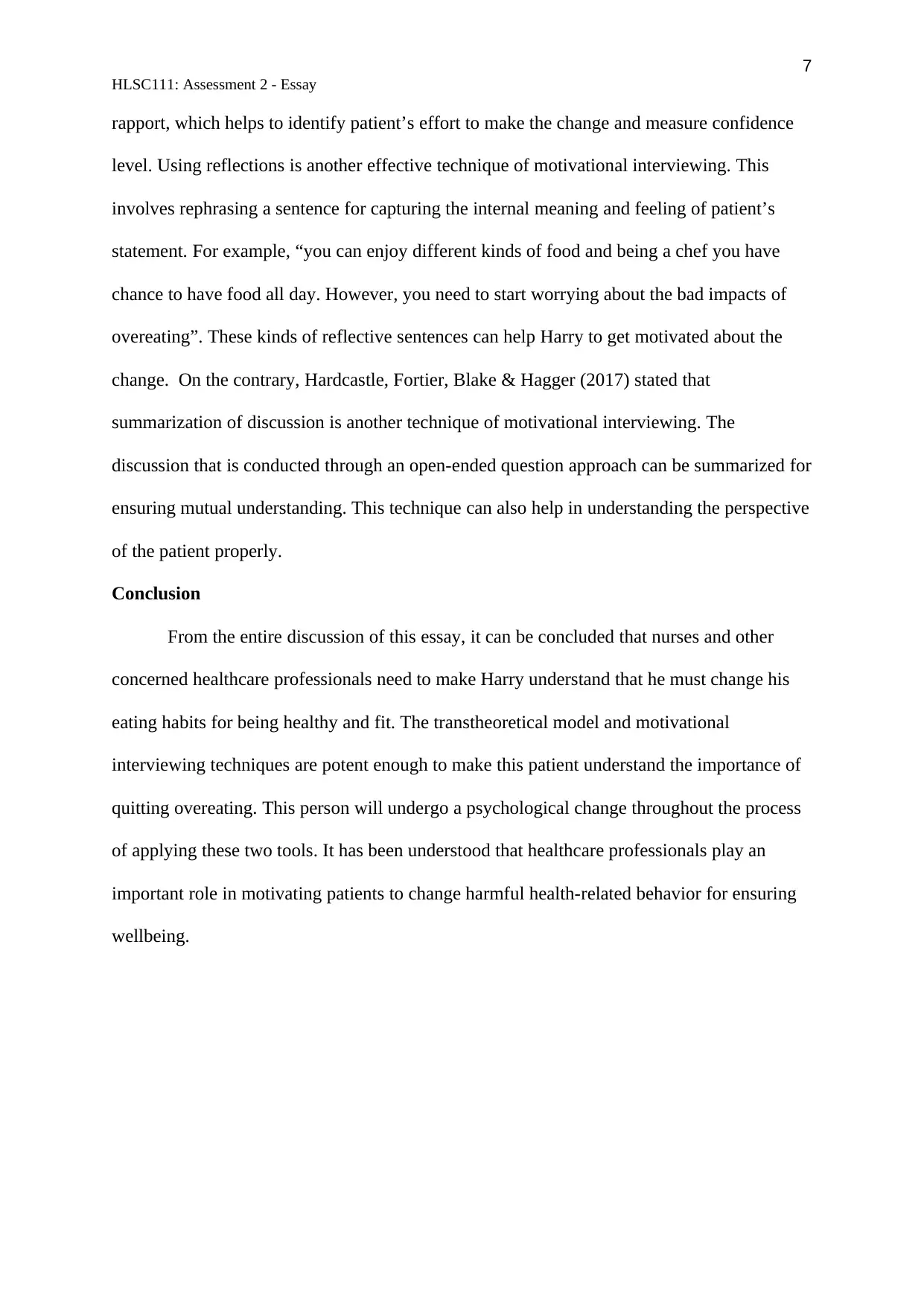
7
HLSC111: Assessment 2 - Essay
rapport, which helps to identify patient’s effort to make the change and measure confidence
level. Using reflections is another effective technique of motivational interviewing. This
involves rephrasing a sentence for capturing the internal meaning and feeling of patient’s
statement. For example, “you can enjoy different kinds of food and being a chef you have
chance to have food all day. However, you need to start worrying about the bad impacts of
overeating”. These kinds of reflective sentences can help Harry to get motivated about the
change. On the contrary, Hardcastle, Fortier, Blake & Hagger (2017) stated that
summarization of discussion is another technique of motivational interviewing. The
discussion that is conducted through an open-ended question approach can be summarized for
ensuring mutual understanding. This technique can also help in understanding the perspective
of the patient properly.
Conclusion
From the entire discussion of this essay, it can be concluded that nurses and other
concerned healthcare professionals need to make Harry understand that he must change his
eating habits for being healthy and fit. The transtheoretical model and motivational
interviewing techniques are potent enough to make this patient understand the importance of
quitting overeating. This person will undergo a psychological change throughout the process
of applying these two tools. It has been understood that healthcare professionals play an
important role in motivating patients to change harmful health-related behavior for ensuring
wellbeing.
HLSC111: Assessment 2 - Essay
rapport, which helps to identify patient’s effort to make the change and measure confidence
level. Using reflections is another effective technique of motivational interviewing. This
involves rephrasing a sentence for capturing the internal meaning and feeling of patient’s
statement. For example, “you can enjoy different kinds of food and being a chef you have
chance to have food all day. However, you need to start worrying about the bad impacts of
overeating”. These kinds of reflective sentences can help Harry to get motivated about the
change. On the contrary, Hardcastle, Fortier, Blake & Hagger (2017) stated that
summarization of discussion is another technique of motivational interviewing. The
discussion that is conducted through an open-ended question approach can be summarized for
ensuring mutual understanding. This technique can also help in understanding the perspective
of the patient properly.
Conclusion
From the entire discussion of this essay, it can be concluded that nurses and other
concerned healthcare professionals need to make Harry understand that he must change his
eating habits for being healthy and fit. The transtheoretical model and motivational
interviewing techniques are potent enough to make this patient understand the importance of
quitting overeating. This person will undergo a psychological change throughout the process
of applying these two tools. It has been understood that healthcare professionals play an
important role in motivating patients to change harmful health-related behavior for ensuring
wellbeing.
Paraphrase This Document
Need a fresh take? Get an instant paraphrase of this document with our AI Paraphraser
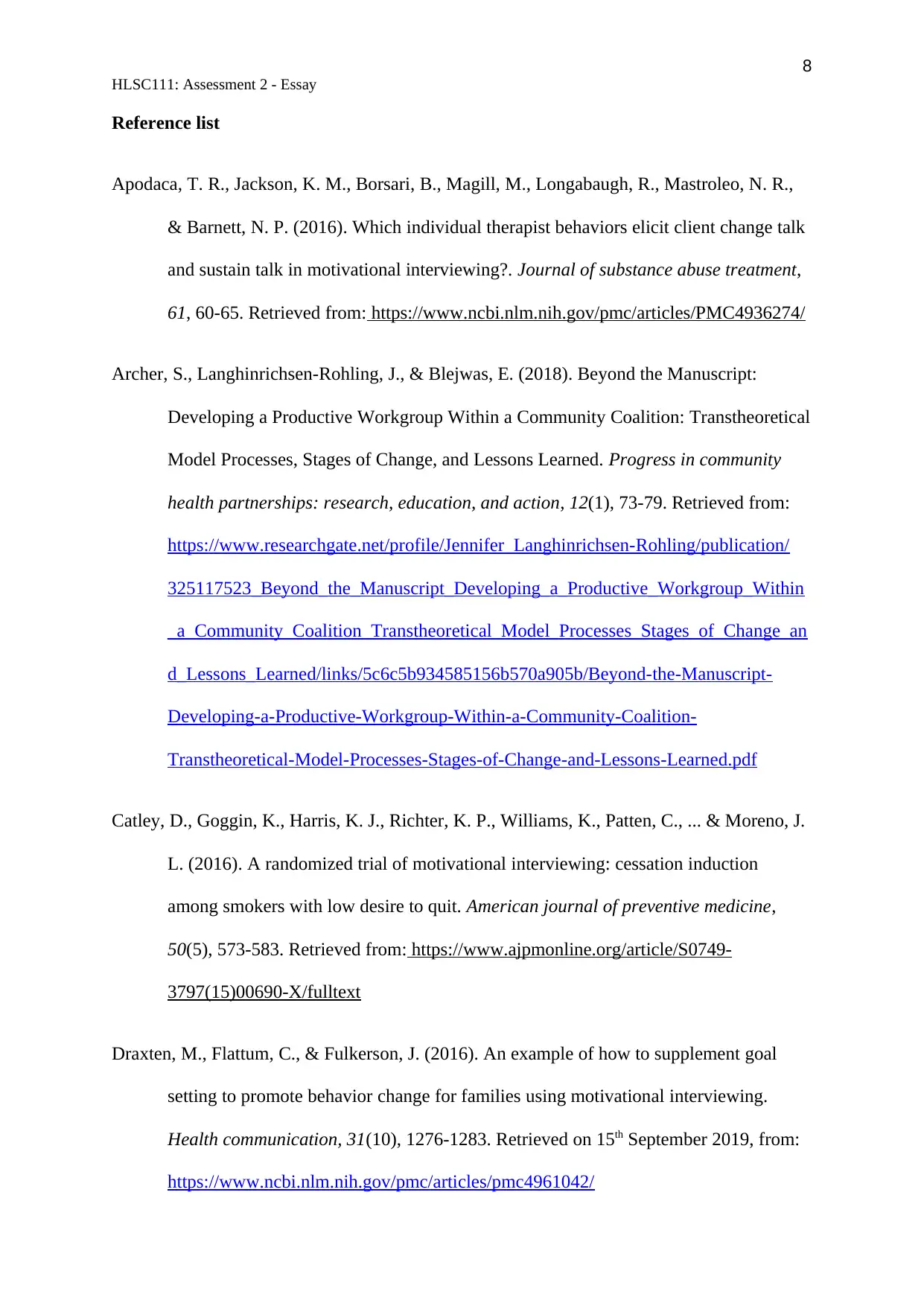
8
HLSC111: Assessment 2 - Essay
Reference list
Apodaca, T. R., Jackson, K. M., Borsari, B., Magill, M., Longabaugh, R., Mastroleo, N. R.,
& Barnett, N. P. (2016). Which individual therapist behaviors elicit client change talk
and sustain talk in motivational interviewing?. Journal of substance abuse treatment,
61, 60-65. Retrieved from: https://www.ncbi.nlm.nih.gov/pmc/articles/PMC4936274/
Archer, S., Langhinrichsen-Rohling, J., & Blejwas, E. (2018). Beyond the Manuscript:
Developing a Productive Workgroup Within a Community Coalition: Transtheoretical
Model Processes, Stages of Change, and Lessons Learned. Progress in community
health partnerships: research, education, and action, 12(1), 73-79. Retrieved from:
https://www.researchgate.net/profile/Jennifer_Langhinrichsen-Rohling/publication/
325117523_Beyond_the_Manuscript_Developing_a_Productive_Workgroup_Within
_a_Community_Coalition_Transtheoretical_Model_Processes_Stages_of_Change_an
d_Lessons_Learned/links/5c6c5b934585156b570a905b/Beyond-the-Manuscript-
Developing-a-Productive-Workgroup-Within-a-Community-Coalition-
Transtheoretical-Model-Processes-Stages-of-Change-and-Lessons-Learned.pdf
Catley, D., Goggin, K., Harris, K. J., Richter, K. P., Williams, K., Patten, C., ... & Moreno, J.
L. (2016). A randomized trial of motivational interviewing: cessation induction
among smokers with low desire to quit. American journal of preventive medicine,
50(5), 573-583. Retrieved from: https://www.ajpmonline.org/article/S0749-
3797(15)00690-X/fulltext
Draxten, M., Flattum, C., & Fulkerson, J. (2016). An example of how to supplement goal
setting to promote behavior change for families using motivational interviewing.
Health communication, 31(10), 1276-1283. Retrieved on 15th September 2019, from:
https://www.ncbi.nlm.nih.gov/pmc/articles/pmc4961042/
HLSC111: Assessment 2 - Essay
Reference list
Apodaca, T. R., Jackson, K. M., Borsari, B., Magill, M., Longabaugh, R., Mastroleo, N. R.,
& Barnett, N. P. (2016). Which individual therapist behaviors elicit client change talk
and sustain talk in motivational interviewing?. Journal of substance abuse treatment,
61, 60-65. Retrieved from: https://www.ncbi.nlm.nih.gov/pmc/articles/PMC4936274/
Archer, S., Langhinrichsen-Rohling, J., & Blejwas, E. (2018). Beyond the Manuscript:
Developing a Productive Workgroup Within a Community Coalition: Transtheoretical
Model Processes, Stages of Change, and Lessons Learned. Progress in community
health partnerships: research, education, and action, 12(1), 73-79. Retrieved from:
https://www.researchgate.net/profile/Jennifer_Langhinrichsen-Rohling/publication/
325117523_Beyond_the_Manuscript_Developing_a_Productive_Workgroup_Within
_a_Community_Coalition_Transtheoretical_Model_Processes_Stages_of_Change_an
d_Lessons_Learned/links/5c6c5b934585156b570a905b/Beyond-the-Manuscript-
Developing-a-Productive-Workgroup-Within-a-Community-Coalition-
Transtheoretical-Model-Processes-Stages-of-Change-and-Lessons-Learned.pdf
Catley, D., Goggin, K., Harris, K. J., Richter, K. P., Williams, K., Patten, C., ... & Moreno, J.
L. (2016). A randomized trial of motivational interviewing: cessation induction
among smokers with low desire to quit. American journal of preventive medicine,
50(5), 573-583. Retrieved from: https://www.ajpmonline.org/article/S0749-
3797(15)00690-X/fulltext
Draxten, M., Flattum, C., & Fulkerson, J. (2016). An example of how to supplement goal
setting to promote behavior change for families using motivational interviewing.
Health communication, 31(10), 1276-1283. Retrieved on 15th September 2019, from:
https://www.ncbi.nlm.nih.gov/pmc/articles/pmc4961042/
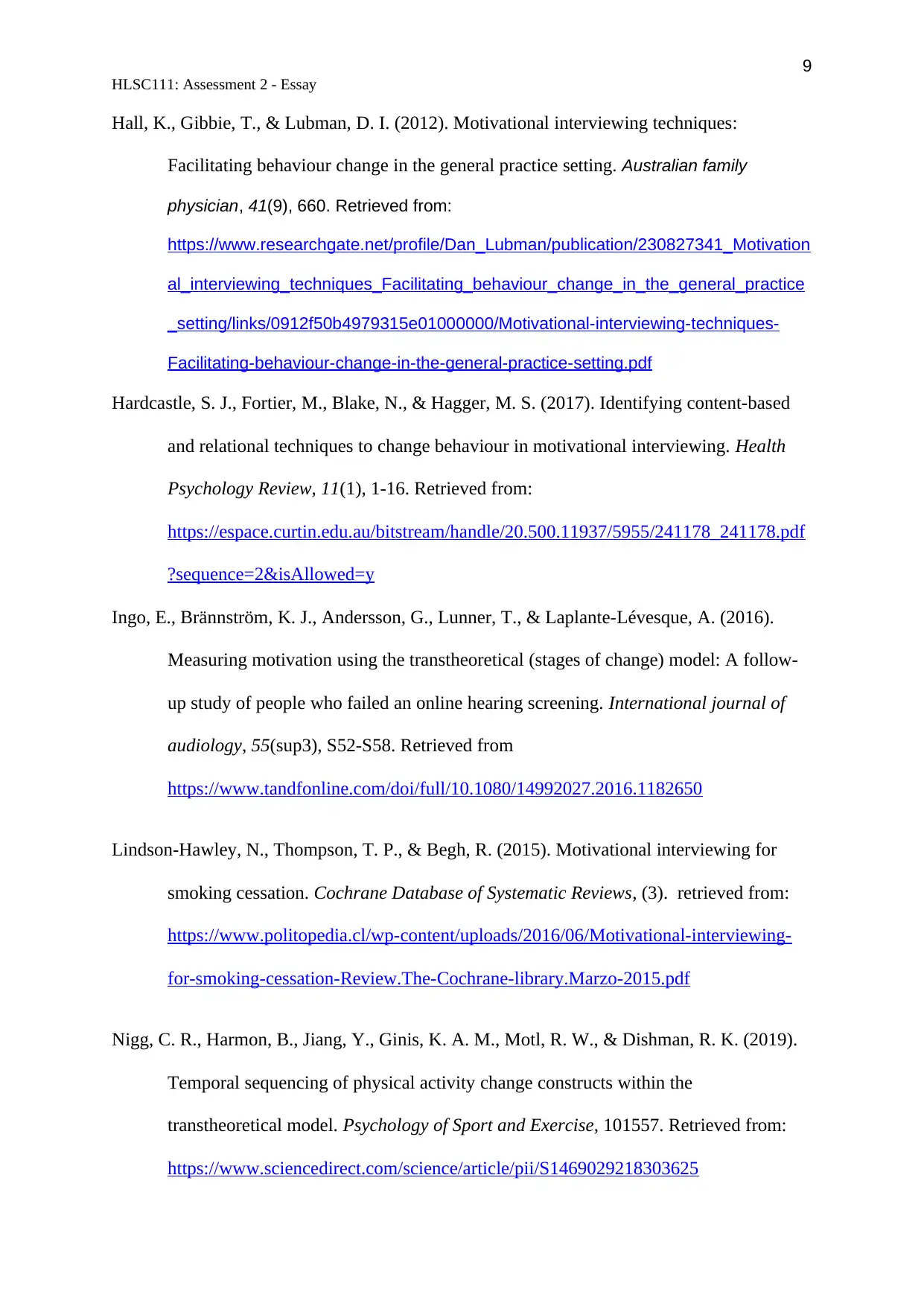
9
HLSC111: Assessment 2 - Essay
Hall, K., Gibbie, T., & Lubman, D. I. (2012). Motivational interviewing techniques:
Facilitating behaviour change in the general practice setting. Australian family
physician, 41(9), 660. Retrieved from:
https://www.researchgate.net/profile/Dan_Lubman/publication/230827341_Motivation
al_interviewing_techniques_Facilitating_behaviour_change_in_the_general_practice
_setting/links/0912f50b4979315e01000000/Motivational-interviewing-techniques-
Facilitating-behaviour-change-in-the-general-practice-setting.pdf
Hardcastle, S. J., Fortier, M., Blake, N., & Hagger, M. S. (2017). Identifying content-based
and relational techniques to change behaviour in motivational interviewing. Health
Psychology Review, 11(1), 1-16. Retrieved from:
https://espace.curtin.edu.au/bitstream/handle/20.500.11937/5955/241178_241178.pdf
?sequence=2&isAllowed=y
Ingo, E., Brännström, K. J., Andersson, G., Lunner, T., & Laplante-Lévesque, A. (2016).
Measuring motivation using the transtheoretical (stages of change) model: A follow-
up study of people who failed an online hearing screening. International journal of
audiology, 55(sup3), S52-S58. Retrieved from
https://www.tandfonline.com/doi/full/10.1080/14992027.2016.1182650
Lindson‐Hawley, N., Thompson, T. P., & Begh, R. (2015). Motivational interviewing for
smoking cessation. Cochrane Database of Systematic Reviews, (3). retrieved from:
https://www.politopedia.cl/wp-content/uploads/2016/06/Motivational-interviewing-
for-smoking-cessation-Review.The-Cochrane-library.Marzo-2015.pdf
Nigg, C. R., Harmon, B., Jiang, Y., Ginis, K. A. M., Motl, R. W., & Dishman, R. K. (2019).
Temporal sequencing of physical activity change constructs within the
transtheoretical model. Psychology of Sport and Exercise, 101557. Retrieved from:
https://www.sciencedirect.com/science/article/pii/S1469029218303625
HLSC111: Assessment 2 - Essay
Hall, K., Gibbie, T., & Lubman, D. I. (2012). Motivational interviewing techniques:
Facilitating behaviour change in the general practice setting. Australian family
physician, 41(9), 660. Retrieved from:
https://www.researchgate.net/profile/Dan_Lubman/publication/230827341_Motivation
al_interviewing_techniques_Facilitating_behaviour_change_in_the_general_practice
_setting/links/0912f50b4979315e01000000/Motivational-interviewing-techniques-
Facilitating-behaviour-change-in-the-general-practice-setting.pdf
Hardcastle, S. J., Fortier, M., Blake, N., & Hagger, M. S. (2017). Identifying content-based
and relational techniques to change behaviour in motivational interviewing. Health
Psychology Review, 11(1), 1-16. Retrieved from:
https://espace.curtin.edu.au/bitstream/handle/20.500.11937/5955/241178_241178.pdf
?sequence=2&isAllowed=y
Ingo, E., Brännström, K. J., Andersson, G., Lunner, T., & Laplante-Lévesque, A. (2016).
Measuring motivation using the transtheoretical (stages of change) model: A follow-
up study of people who failed an online hearing screening. International journal of
audiology, 55(sup3), S52-S58. Retrieved from
https://www.tandfonline.com/doi/full/10.1080/14992027.2016.1182650
Lindson‐Hawley, N., Thompson, T. P., & Begh, R. (2015). Motivational interviewing for
smoking cessation. Cochrane Database of Systematic Reviews, (3). retrieved from:
https://www.politopedia.cl/wp-content/uploads/2016/06/Motivational-interviewing-
for-smoking-cessation-Review.The-Cochrane-library.Marzo-2015.pdf
Nigg, C. R., Harmon, B., Jiang, Y., Ginis, K. A. M., Motl, R. W., & Dishman, R. K. (2019).
Temporal sequencing of physical activity change constructs within the
transtheoretical model. Psychology of Sport and Exercise, 101557. Retrieved from:
https://www.sciencedirect.com/science/article/pii/S1469029218303625
⊘ This is a preview!⊘
Do you want full access?
Subscribe today to unlock all pages.

Trusted by 1+ million students worldwide
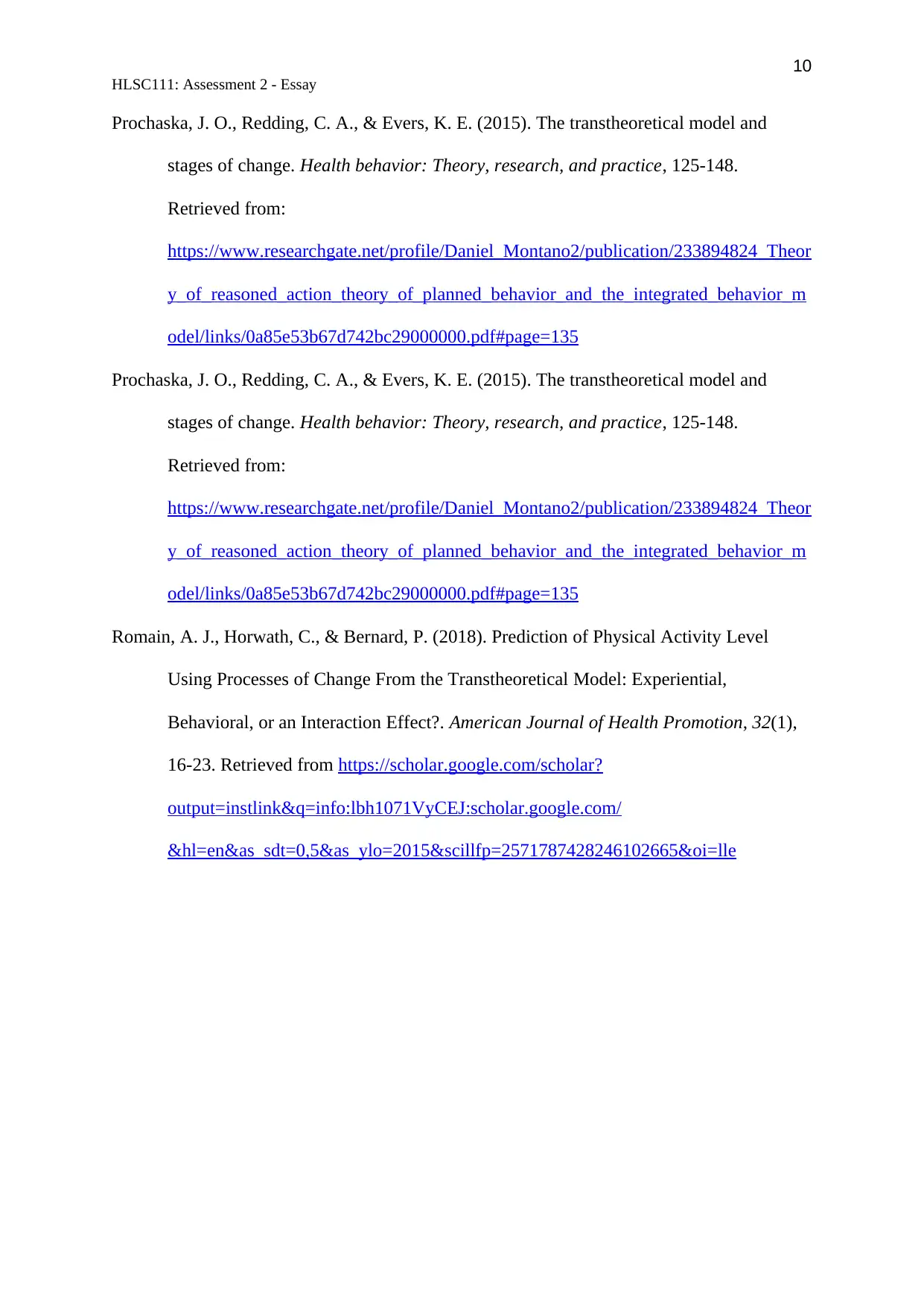
10
HLSC111: Assessment 2 - Essay
Prochaska, J. O., Redding, C. A., & Evers, K. E. (2015). The transtheoretical model and
stages of change. Health behavior: Theory, research, and practice, 125-148.
Retrieved from:
https://www.researchgate.net/profile/Daniel_Montano2/publication/233894824_Theor
y_of_reasoned_action_theory_of_planned_behavior_and_the_integrated_behavior_m
odel/links/0a85e53b67d742bc29000000.pdf#page=135
Prochaska, J. O., Redding, C. A., & Evers, K. E. (2015). The transtheoretical model and
stages of change. Health behavior: Theory, research, and practice, 125-148.
Retrieved from:
https://www.researchgate.net/profile/Daniel_Montano2/publication/233894824_Theor
y_of_reasoned_action_theory_of_planned_behavior_and_the_integrated_behavior_m
odel/links/0a85e53b67d742bc29000000.pdf#page=135
Romain, A. J., Horwath, C., & Bernard, P. (2018). Prediction of Physical Activity Level
Using Processes of Change From the Transtheoretical Model: Experiential,
Behavioral, or an Interaction Effect?. American Journal of Health Promotion, 32(1),
16-23. Retrieved from https://scholar.google.com/scholar?
output=instlink&q=info:lbh1071VyCEJ:scholar.google.com/
&hl=en&as_sdt=0,5&as_ylo=2015&scillfp=2571787428246102665&oi=lle
HLSC111: Assessment 2 - Essay
Prochaska, J. O., Redding, C. A., & Evers, K. E. (2015). The transtheoretical model and
stages of change. Health behavior: Theory, research, and practice, 125-148.
Retrieved from:
https://www.researchgate.net/profile/Daniel_Montano2/publication/233894824_Theor
y_of_reasoned_action_theory_of_planned_behavior_and_the_integrated_behavior_m
odel/links/0a85e53b67d742bc29000000.pdf#page=135
Prochaska, J. O., Redding, C. A., & Evers, K. E. (2015). The transtheoretical model and
stages of change. Health behavior: Theory, research, and practice, 125-148.
Retrieved from:
https://www.researchgate.net/profile/Daniel_Montano2/publication/233894824_Theor
y_of_reasoned_action_theory_of_planned_behavior_and_the_integrated_behavior_m
odel/links/0a85e53b67d742bc29000000.pdf#page=135
Romain, A. J., Horwath, C., & Bernard, P. (2018). Prediction of Physical Activity Level
Using Processes of Change From the Transtheoretical Model: Experiential,
Behavioral, or an Interaction Effect?. American Journal of Health Promotion, 32(1),
16-23. Retrieved from https://scholar.google.com/scholar?
output=instlink&q=info:lbh1071VyCEJ:scholar.google.com/
&hl=en&as_sdt=0,5&as_ylo=2015&scillfp=2571787428246102665&oi=lle
1 out of 10
Related Documents
Your All-in-One AI-Powered Toolkit for Academic Success.
+13062052269
info@desklib.com
Available 24*7 on WhatsApp / Email
![[object Object]](/_next/static/media/star-bottom.7253800d.svg)
Unlock your academic potential
Copyright © 2020–2026 A2Z Services. All Rights Reserved. Developed and managed by ZUCOL.





